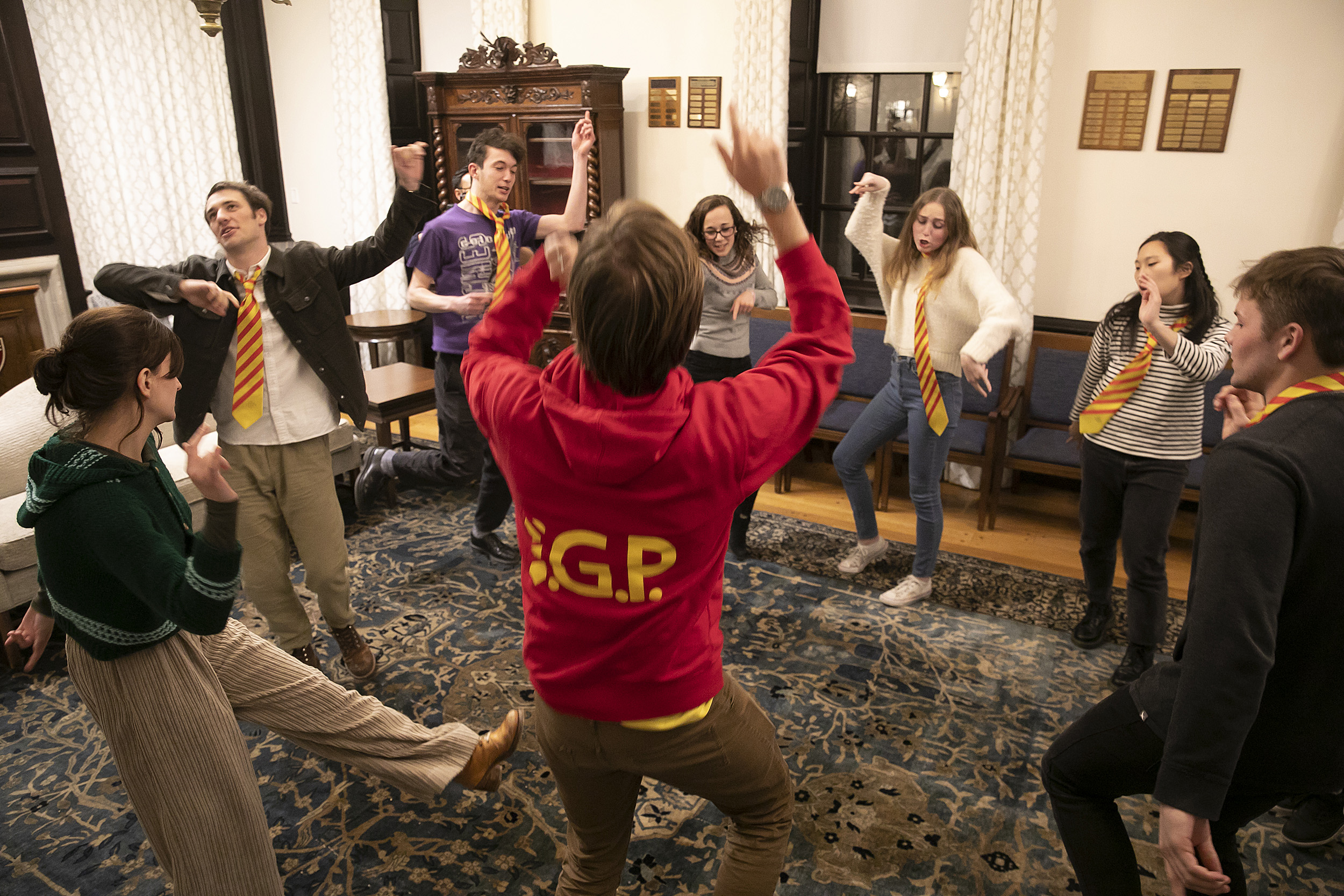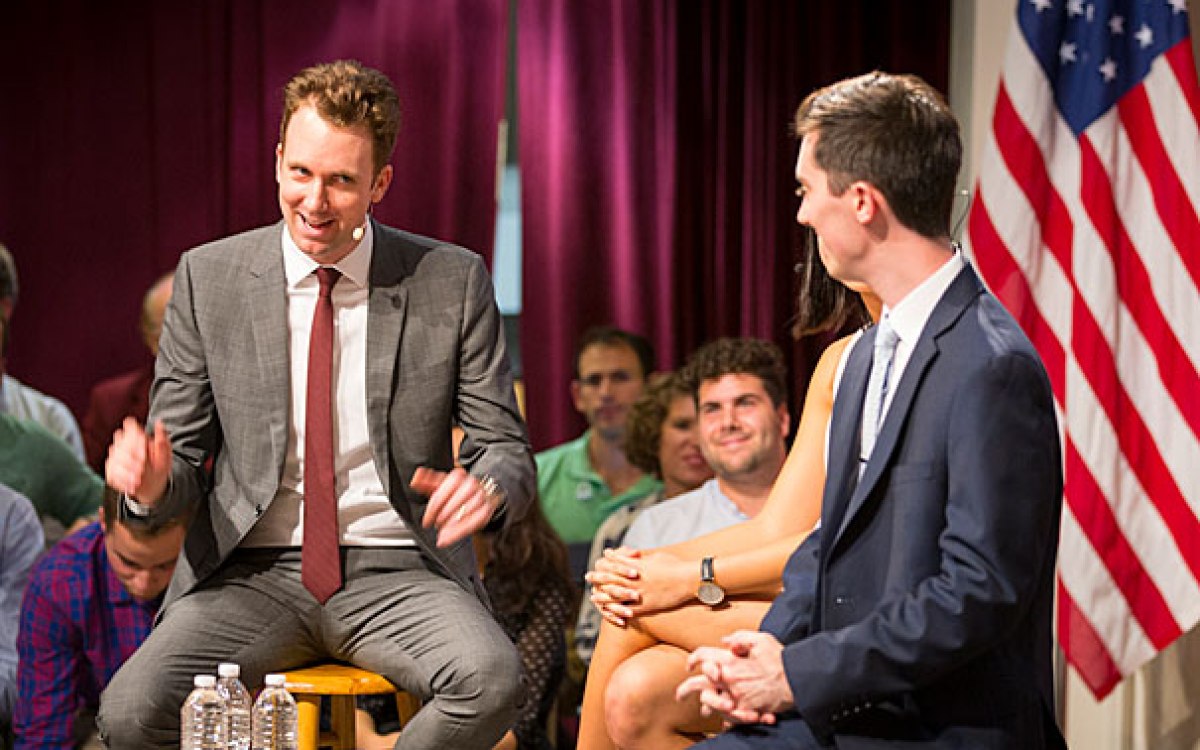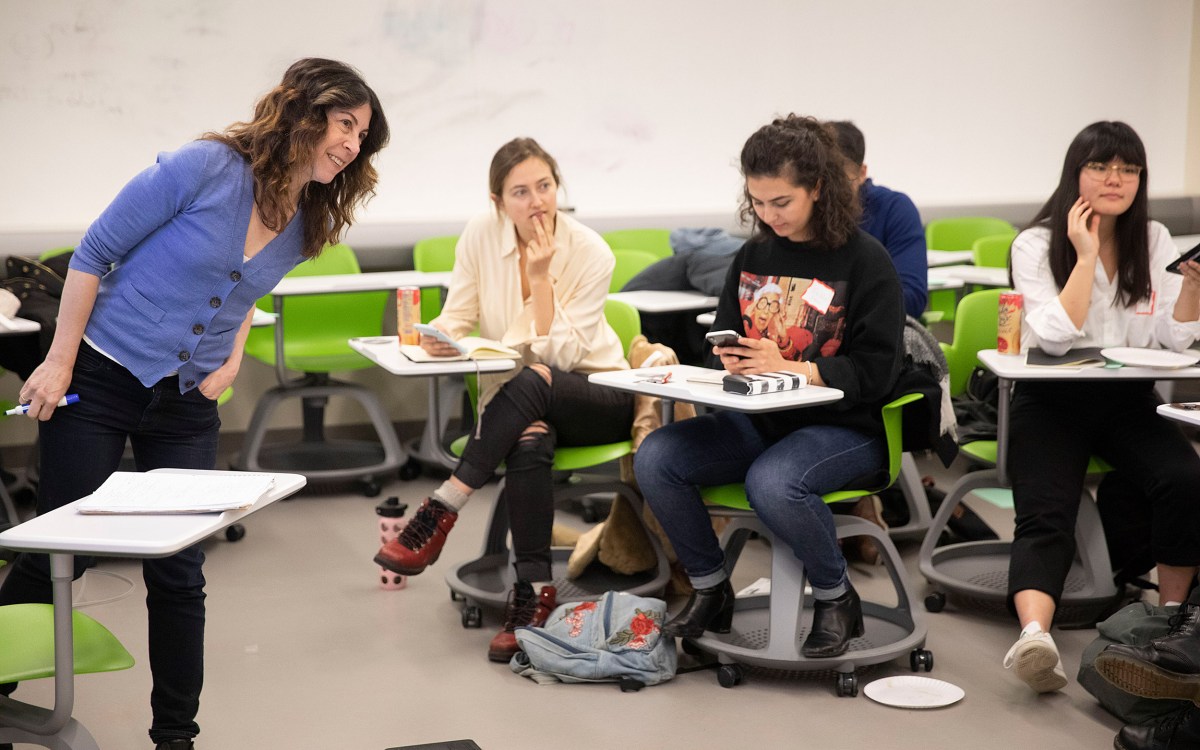Video by Kai-Jae Wang/Harvard Staff
For more than just laughs
Improv can boost social and professional skills, students find
Your word is creamed corn.
With that prompt, the common room inside Dunster House transformed into a barnyard as Elise Chenevey ’22 and Frank Garland ’20, members of Harvard College’s Immediate Gratification Players (IGP), acted out a comedic scene of a city-dwelling niece visiting her uncle’s farm.
“I’m glad to have you here, Annie,” Garland said in a Southern drawl as he operated some kind of invisible churn. “I’ve always said the farm sure could use a helper, and having my own niece here with her city skills, well, sure does wile away the time, I’ll tell you that.”
“Yeah, well, you know, I didn’t have [anyplace] else to go since my parents’ divorce so… thank you for having me, Uncle Ed? I guess,” Chenevey said, her character clearly uninterested in being there.
“Well, sure thing,” Garland responded cheerily. “I think there’s nothing better to take a little girl’s mind off her own woes than a li’l bit of corn mashing at dusk every evening.”
The three-line scene ended with chuckles from other IGP members attending the troupe’s rehearsal as the next pair of performers stepped up for their own scene with a new prompt. These two hid from dragons in an imaginary fort. Another pair argued over the best way to capture vampire bats with their bare hands. Each scene was an example of on-the-fly creation, grounded with characters and scenarios that were instantly recognizable, ridiculous in some way, and, perhaps surprisingly, an activity involving skills they could one day use to land a job.

Harvard’s Immediate Gratification Players practice their improv techniques at Dunster House.
Jon Chase/Harvard Staff Photographer
Improvisation (or improv) — a form of live theatre where the plot, characters, and dialogue are made up in the moment — has been used as a springboard for some of the biggest names in comedy. Will Ferrell, Tina Fey, Amy Poehler, Chris Farley, Steve Carell, and Stephen Colbert all had their start on an improv stage.
But the form can go beyond entertainment. The skills performers learn in improv — teamwork, collaboration, listening, communication, and the ability to adapt and problem-solve — can translate to social and professional skills sought after in many workplaces. They are at the core of what makes an improv show soar.
In improv, audience members provide words or prompts that the troupe riffs on to create an entire show. To do that, troupe members need to be in sync, building off ideas already introduced and then efficiently adding new twists. Most importantly, like all work teams, performers need to trust and support one another to be successful.
“In a show, you’re going to be out there at some point saying something completely ridiculous,” said Garland, “and if no one on your team is going to support you then you’re going to look like a fool. A lot of the skills that help you in improv help you support other people.”
To build that trust and rapport, members practice a number of “games” to get mentally loose. One is “Whoosh,” a warm-up in which players verbally pass an invisible “whoosh” around a circle, changing direction every time a person says “whoa.” Rules are added on top of this to keep players on their toes. At IGP’s rehearsal, for example, when someone called out “Star Trek,” everyone responded in unison, “I am a Klingon warrior!” When another player shouted, “Hope, sing us a song!” Hope Green ’20 belted out lyrics from the first tune that popped into her head.
“It’s just meant to be a fun way to build up energy and practice saying ‘yes’ to your team no matter what ridiculous thing they ask you to do,” Garland said.
“A lot of the skills that help you in improv help you support other people.”
Frank Garland
It also highlights many of the soft skills that can be transferred to the work world, like being an engaged and active listener and being able to process information and react. If something comes up unexpectedly, these improvvers are ready to address it.
“[Improv] shows that you can solve problems in real time and come up with solutions,” said IGP member Tucker Flodman ’19. “That’s basically what improv is — going onstage and not knowing what’s going to happen and just feeling confident that you’ve trained yourself to deal with that.”
Some of the players specifically mention that improv can build social and interpersonal skills.
“I can relate to people a lot better,” said Emma Choi ’22, who this year joined IGP, one of four improv groups on campus. “The characters that we play help us understand a lot more different kinds of people and a lot of ways of thinking, especially when you’re interacting with new kinds of people. It’s easier to get in their heads and think, ‘In this scenario are they comfortable, are they excited, are they happy?’ And seeing that and recognizing that. It’s really helpful to adapt to new scenarios really quickly.”
“Improv definitely flexes the social muscles,” said Garland, who can attest to the confidence this form of comedy instills in its practitioners. It’s made him more outgoing and allowed him to interact more easily with others. “It has certainly helped me be more willing to engage with the world and talk to people, look people in the eye when they’re talking to me — the sort of thing that can make a conversation or socializing [easier].”
For similar reasons, companies, nonprofits, and universities routinely hire improv troupes for custom workshops to help employees improve these skills. Lawyers-in-training are sometimes coached on how to interview and cross-examine witnesses with actors playing the role on the stand. Doctors-in-training have worked with actor-patients. And schools have hired improv actors to run mock counseling sessions with social-workers-in-training. At Harvard University, the Bok Center Players — who use theatrical methods to educate audiences as part of the applied theater initiative at the Bok Center for Teaching and Learning — have, through improv, addressed challenging topics such as race, gender, and identity.
One company, Collective Capital, works with businesses and organizations to run customized improvisation workshops as professional development. Co-founded in 2014 by Mona Thompson, a master’s candidate at the Harvard Graduate School of Education (HGSE), the group’s workshops have helped teams in San Francisco and Boston.
“In terms of skills employers are looking for… some of the themes that have come up are around really listening and being curious, trusting your instincts, building on the ideas of others, taking risks, learning from mistakes, and telling stories to convey a message,” Thompson said. “We work with a lot of companies that are growing, adding new employees, and are trying to get their teams to build trust. Improv has been a wonderful tool to facilitate this kind of authentic and playful connection.”
Thompson recently brought her improv training to HGSE, running an “Improv for Educators” course in January that helped participants hone skills that are necessary in the classroom but can also be applied beyond it.
“The whole [improv] thing functions as a metaphor for other things you encounter in your life,” Thompson said. “It’s really fun to be in this playful and generous space where you can try out ideas and think as you step out of it about what you can carry forward and how you can take it into your life and your [work].”






